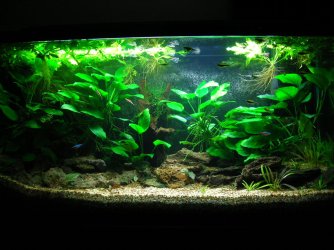Divinityinlove
Fish Crazy
Temporary aquarium plants are a thing. Usually they are bog plants or plants from flooding zones. They hold their own for a bit, then it becomes too much.
I have Anubias and Bolbitis, stream margin plants, that have acclimated and grown like mad underwater. The Bolbitis has thrived for 30 years, and the Anubias is around 20 now.
A lot of people take the view that aquatic plants and even fish are short lived, disposable decor.
Planting plants in aquarium gravel with water pressure and such is an extremely annoyingly difficult thing for me, very arduous trying to make them stay in the gravel, and I cannot fathom why someone would want to do this if they don't plan to have it there longterm! I will have to remove the two mentioned. So basically all 4 plants I purchased in an aquatic shop are not even aquatic



